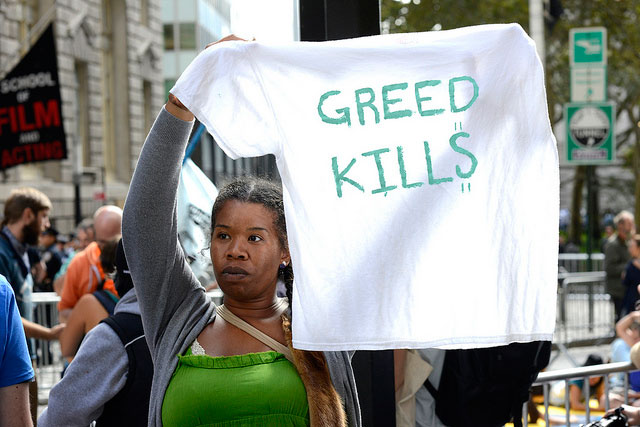
Dean Baker bases his latest book on the premise that “globalization and the rules of the modern economy were structured to make the rich richer.” In this excerpt from Rigged, he argues that there is nothing free or resilient about the myth of the “free market.”
In short, there is no truth to the story that the job loss and wage stagnation faced by manufacturing workers in the United States and other wealthy countries was a necessary price for reducing poverty in the developing world. This is a fiction that is used to justify the upward redistribution of income in rich countries. After all, it is pretty selfish for autoworkers and textile workers in rich countries to begrudge hungry people in Africa and Asia and the means to secure food, clothing, and shelter.
The other aspect of this story that deserves mention is the nature of the jobs to which our supposedly selfish workers feel entitled. The manufacturing jobs that are being lost to the developing world pay in the range of $15 to $30 an hour, with the vast majority closer to the bottom figure than the top. The average hourly wage for production and nonsupervisory workers in manufacturing in 2015 was just under $20 an hour, or about $40,000 a year. While a person earning $40,000 is doing much better than a subsistence farmer in Sub-Saharan Africa, it is difficult to see this worker as especially privileged.
By contrast, many of the people remarking on the narrow-mindedness and sense of entitlement of manufacturing workers earn comfortable six-figure salaries. Senior writers and editors at network news shows or at The New York Times and The Washington Post feel entitled to their pay because they feel they have the education and skills to be successful in a rapidly changing global economy.
These are the sort of people who consider it a sacrifice to work at a high-level government job for $150,000 to $200,000 a year. For example, Timothy Geithner, President Obama’s first Treasury Secretary, often boasts about his choice to work for various government agencies rather than earn big bucks in the private sector. His sacrifice included a stint as president of the Federal Reserve Bank of New York that paid $415,000 a year. This level of pay put Geithner well into the top 1 percent of wage earners.
Geithner’s comments about his sacrifices in public service did not elicit any outcry from the media at the time because his perspective was widely shared. The implicit assumption is that the sort of person who is working at a high level government job could easily be earning a paycheck that is many times higher if they were employed elsewhere. In fact, this is often true. When he left his job as Treasury Secretary, Geithner took a position with a private equity company where his salary is likely several million dollars a year.
Not everyone who was complaining about entitled manufacturing workers was earning as much as Timothy Geithner, but it is a safe bet that the average critic was earning far more than the average manufacturing worker — and certainly far more than the average displaced manufacturing worker.
Turning the Debate Right-Side Up: Markets Are Structured
The perverse nature of the debate over a trade policy that would have the audacity to benefit workers in rich countries is a great example of how we accept as givens not just markets themselves but also the policies that structure markets. If we accept it as a fact of nature that poor countries cannot borrow from rich countries to finance their development, and that they can only export manufactured goods, then their growth will depend on displacing manufacturing workers in the United States and other rich countries.
It is absurd to narrow the policy choices in this way, yet the centrists and conservatives who support the upward redistribution of the last four decades have been extremely successful in doing just that, and progressives have largely let them set the terms of the debate.
Markets are never just given. Neither God nor nature hands us a worked-out set of rules determining the way property relations are defined, contracts are enforced, or macroeconomic policy is implemented. These matters are determined by policy choices. The elites have written these rules to redistribute income upward. Needless to say, they are not eager to have the rules rewritten — which means they also have no interest in even having them discussed.
Truthout Progressive Pick
%20(265x400).jpg)
Dean Baker debunks the inevitability of wealth disparity in the US and exposes the economics of a rigged system.
Click here now to get the book!
But for progressive change to succeed, these rules must be addressed. While modest tweaks to tax and transfer policies can ameliorate the harm done by a regressive market structure, their effect will be limited. The complaint of conservatives — that tampering with market outcomes leads to inefficiencies and unintended outcomes — is largely correct, even if they may exaggerate the size of the distortions from policy interventions. Rather than tinker with badly designed rules, it is far more important to rewrite the rules so that markets lead to progressive and productive outcomes in which the benefits of economic growth and improving technology are broadly shared.
Published (2016) by Dean Baker. This excerpt can be reposted, with attribution, under a creative common license.
Join us in defending the truth before it’s too late
The future of independent journalism is uncertain, and the consequences of losing it are too grave to ignore. To ensure Truthout remains safe, strong, and free, we need to raise $50,000 in the next 10 days. Every dollar raised goes directly toward the costs of producing news you can trust.
Please give what you can — because by supporting us with a tax-deductible donation, you’re not just preserving a source of news, you’re helping to safeguard what’s left of our democracy.